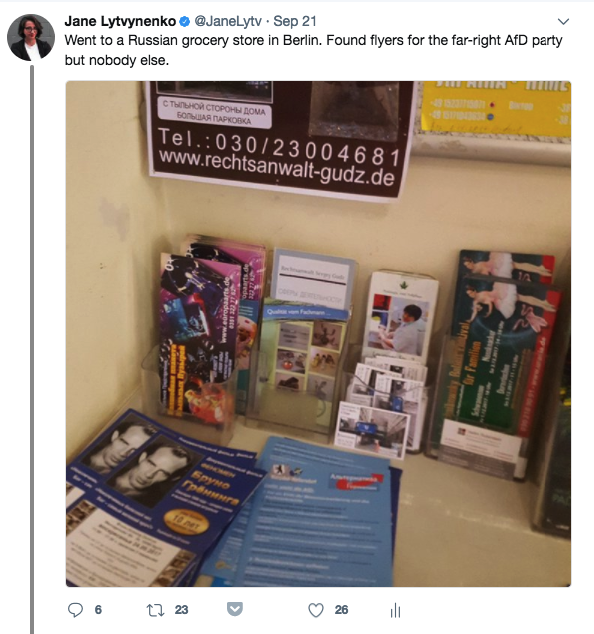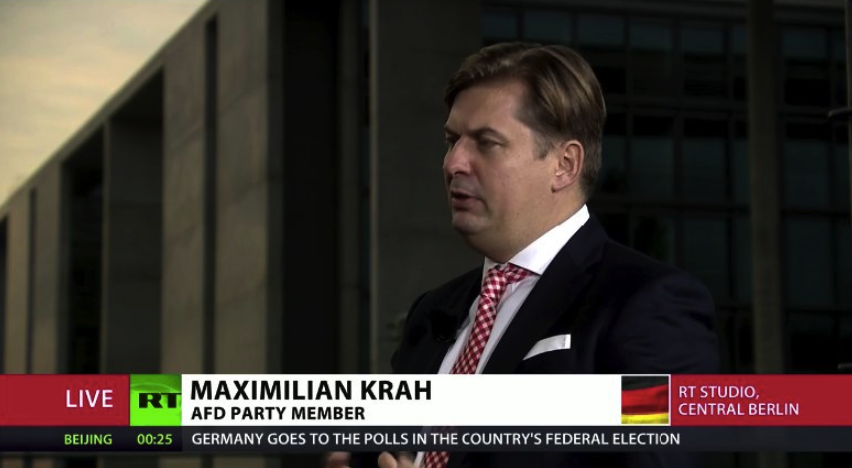
For the first time in 60 years, a far-right party, the AfD, has won seats in German Parliament. From the start of the election campaign, the AfD benefited from copious airtime and coverage from Russian state media, as well as a push from Russian hackers running Twitter bots.
Here's how AfD's message was promoted by Russian media, and how the AfD itself targeted Russian speakers in Germany.
Leading up to the election, Kremlin-funded and affiliated outlets posted uncritical stories about the AfD. One report from Ria.ru, a news agency that's part of the Russia Today network, got picked up across the country.

The AfD itself also explicitly targeted Russian speakers in Germany by running ads on Russian state media.

The party also targeted Facebook ads at Russian speakers (though the ad's language was a bit stilted).

Russian-language newspapers also ran advertisements for the AfD, according to Coda Story social media editor Katrin Sheib.
The #AfD ad now takes up most of the front page - and there are still no ads from any other party inside. I rest my… https://t.co/ri9p3mom5w
The party also distributed Russian-language flyers in Germany. The flyers promised to end sanctions against Russia, end mass migration into Germany, and take the country out of the EU.

While pro-AfD messages flowed on Russian TV, websites, and newspapers, Twitter bots controlled by hackers in Russia were also hard at work promoting the party. One hacker told BuzzFeed News they used bots to spread pro-AfD messages because it was of "mutual benefit." He didn't explain what that meant.

During election night coverage, the Kremlin-funded RT channel heavily promoted the AfD. The only guest on the broadcast was Maximillian Krah, a member of the party. Throughout the hourlong broadcast the focus was squarely on AfD.

There was even a prepared slideshow on AfD's policies aired early in the program. Other parties were not given the same treatment.

Between speeches from candidates, the RT presenter asked Krah about AfD's policies.

The host didn't always ask softball questions, but there was little follow-up on Krah's responses. AfD's campaign largely focused on anti-migrant messaging, but on RT Krah pivoted to say its number one issue was jobs. He said "controversial" comments by candidates had been taken out of context and chalked them up to inexperience.
Krah was asked to analyze election results, and to talk about mistakes other parties potentially made. There were no representatives from other parties on the broadcast, though it's unclear if they declined to participate or if they were not invited.
RT's broadcast also puzzlingly featured a video of memes YouTuber Forbiddennickname created of socialist candidate Martin Schulz.
On its website, RT published a story that quoted an AfD representative saying Russian interference in the parliamentary elections in Germany had been greatly exaggerated.

As of now, the Kremlin has not issued an official comment on the AfD's strong showing. Kremlin press secretary Dmitriy Peskov said the results are being analyzed. Regarding the AfD, he said the party's gains are "an absolutely internal matter of Germany."

